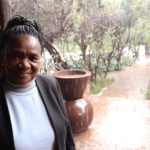© Copyright Bhekisisa Centre for Health Journalism | Privacy Policy | Terms and Conditions | PAIA Manual
Home Search
diabetes - search results
If you're not happy with the results, please do another search
Will the food industry sacrifice its fat profits for health?
South Africa’s growing obesity epidemic won’t be reversed by preaching healthier eating habits and exercise alone; there’s a growing realisation that the food industry needs to change, write David Harrison and Liezel Engelbrecht.
Does SA’s biggest killer show up in your party’s manifesto?
A curable and preventable disease is South Africa’s biggest killer. Is your political party going to do something about it — and does it show up in their election manifesto?
Street vendors, vetkoeks and Cokes: ‘The food tastes good and is cheap’
About one in five teens in South Africa are overweight or have obesity, with eating unhealthy foods being a big part of the problem. But changing policies to make cities healthier can help school kids eat better — and set them up for a healthier future. Cape Town is part of a project to do this.
Wake up: Sleeplessness is a public health crisis
When you’re not feeling rested and refreshed after a night’s sleep, your thinking is fuzzy, your reaction time drops and you feel sluggish at work. But more and more research shows that sleeping poorly is a big public health worry. Today, on World Sleep Day, two experts explain why.
Stigma, inaction and cost: Will SA treat obesity with lessons learned from HIV?
About two-thirds of women and almost a third of men in South Africa are overweight or have obesity. It’s a new public health threat, which, if not acted on now, will have serious consequences for the wellbeing of the country. But rather than making it a game of blame and shame, there are two things that can be done right now.
[WATCH] Is snoring a sign of a sleep disorder?
Sleep apnoea means you stop breathing for some time while asleep. Your brain then tells your body to wake up so that you can get much-needed oxygen. Picture this happening 42 times an hour every night. That’s what Juanita Herholdt used to go through before getting tested and treated for this sleep disorder.
Big hospital, big boss — Bara ICU’s Rudo Mathivha retires
In July, Rudo Mathivha handed in her notice at Chris Hani Baragwanath Academic Hospital, ending a rightly celebrated 25-year stint as head of the intensive care unit. It was after a truly terrible year. Her story underscores the extent to which quality healthcare for the country’s most vulnerable people remains at the mercy of the indifferent and the corrupt.
Our most-read stories of 2023
Before the festive season kicks off, take a look at Bhekisisa’s most-read stories of 2023.
How to get meds to Africa faster — and safer
South Africa’s medicines regulator is helping to process pharmaceutical companies’ applications for medicines to be approved by the African Medicines Agency. But the country won’t have a say in the appointment of the agency’s head because it hasn’t yet ratified the treaty for its establishment.
#COP28: The spread of HIV has slowed down over the past 30 years. Will...
Experts at COP28 have warned that the climate crisis threatens to put us back in the fight against HIV. Floods and droughts will make it harder to adhere to daily treatment and to access HIV prevention medication, and will increase the demand for transactional sex.
Bhekisisa at 10: Here’s what went down at our recent birthday party
On November 7, Bhekisisa celebrated 10 years of health reporting. Policymakers, researchers and activists joined us in marking this milestone. We also sat down to discuss the twin threats of climate change and health.
There is no planet B: How HIV can teach us to deal with the...
Climate change is to public health today what Aids was 30 years ago, experts say — and it could put a spanner in the works for ending Aids as a public health threat by 2030. Yogan Pillay writes in an op-ed today what lessons we can take from responding to HIV to tackle the health effects of climate change.
Why climate change is the biggest threat to health this century
The world is in a polycrisis — and climate change will highlight vulnerabilities and inequalities in healthcare. We need to understand how changing weather patterns will affect our health and draw on lessons from past research to help us become more resilient. Here’s what experts said at Bhekisisa’s 10th birthday celebration on Tuesday, 7 November.
From Moshi to Moscow: How a girl from the slopes of Kilimanjaro became Tanzania’s...
In 1969, Esther Mwaikambo became Tanzania’s first female doctor. Today, she is arguably also the country’s most famous. She tells Sean Christie how public healthcare in Africa has changed — and what she wishes for the future.
Dirty air & diabetes: Scientists say there’s a link
A seven-year study across 12 000 people in two Indian cities shows that breathing in dirty city air for as little as one month can raise blood sugar levels. After a year of this, people have a higher chance of getting type 2 diabetes.
If your dying baby’s organs could save an adult’s life, would you donate them?
A dying baby’s kidneys could save an adult’s life. But it’s a tough decision — and one few grieving parents are willing to make. Would you?





![[WATCH] Is snoring a sign of a sleep disorder?](https://bhekisisa.org/wp-content/uploads/2024/02/Juanita-Herholdt-1_1-150x150.jpg)









